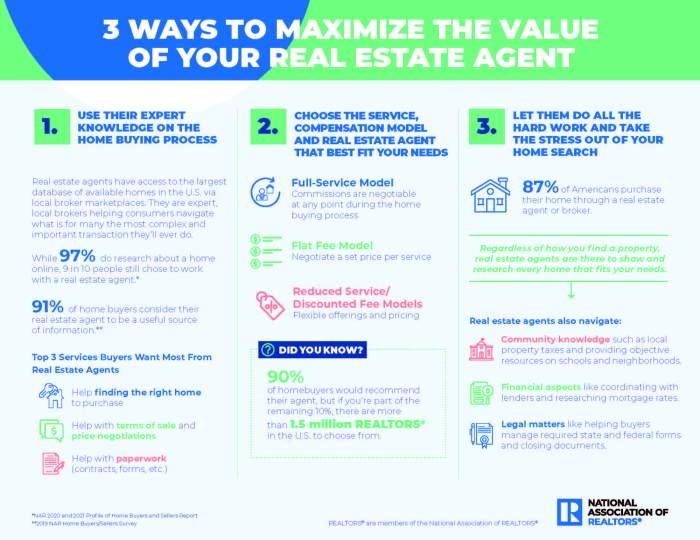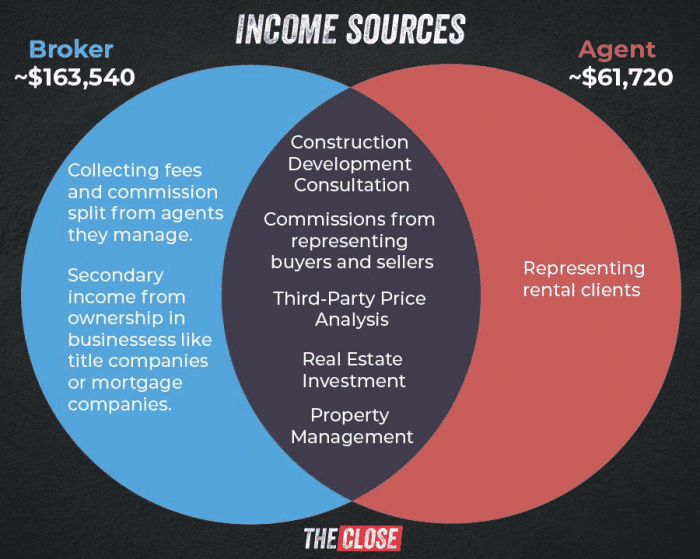What is a single agent in real estate? It’s a question many homebuyers and sellers ask, especially when navigating the complexities of real estate transactions. Understanding the role of a single agent is crucial for a smooth and successful process. This guide will break down the definition, responsibilities, advantages, disadvantages, and legal considerations of working with a single agent, empowering you to make informed decisions.
Essentially, a single agent represents only one party – either the buyer or the seller – in a real estate deal. This dedicated representation ensures undivided loyalty and focused advocacy for their client’s best interests. Unlike dual agency, where an agent represents both buyer and seller, single agency eliminates potential conflicts of interest, leading to more transparent and effective negotiations.
Definition of a Single Agent in Real Estate
In the world of real estate, understanding agency relationships is crucial. A single agent represents only one party in a transaction – either the buyer or the seller. This contrasts sharply with other models, where an agent might represent both sides simultaneously, leading to potential conflicts of interest. This straightforward arrangement offers clarity and focuses the agent’s loyalty and efforts on achieving the best possible outcome for their single client.A single agent has a fiduciary duty to their client.
This means they are legally and ethically bound to act in their client’s best interests, prioritizing their needs and goals above all else. This includes maintaining confidentiality, providing accurate and timely information, and advocating strongly on their behalf throughout the entire buying or selling process. Breaching this fiduciary duty can have serious legal and professional consequences for the agent.
A simple definition for a lay audience would be: A single agent is a real estate professional who works exclusively for either the buyer or the seller in a property transaction.
Legal and Ethical Implications of Single Agency
Representing only one party brings a clear delineation of responsibilities and loyalties. The single agent owes undivided loyalty to their client. This means they must disclose all material facts relevant to the transaction, even if those facts might negatively impact their client’s negotiating position. For example, if the agent learns of a significant defect in a property they are representing the buyer for, they are ethically obligated to disclose this information to their client, even if it means losing the deal.
Conversely, if the agent represents the seller, they must disclose all offers received, regardless of whether they believe the offer is in the seller’s best interests. Failing to uphold these legal and ethical standards can result in lawsuits, disciplinary action from licensing boards, and reputational damage.
Comparison of Single Agency with Other Agency Models
Several agency models exist, each with its own set of rules and responsibilities. Dual agency, for instance, involves representing both the buyer and the seller in the same transaction. This presents inherent conflicts of interest, as the agent must balance the often-competing interests of both parties. Many jurisdictions require agents to disclose this dual agency relationship and obtain informed consent from both parties.
Other models, such as subagency, involve a cooperating agent representing the seller but owing a fiduciary duty to the listing agent rather than the seller directly. In contrast, single agency offers a clear, conflict-free representation, prioritizing the best interests of a single client without the complexities and potential ethical dilemmas inherent in other models. The choice of agency model significantly impacts the level of representation and the responsibilities of the real estate professional involved.
Responsibilities of a Single Agent

Source: clipart-library.com
A single agent in real estate has a significant responsibility to their client. This responsibility goes beyond simply finding a buyer or seller; it involves acting with unwavering loyalty, discretion, and expertise throughout the entire real estate transaction. Understanding these responsibilities is crucial for both the agent and the client to ensure a smooth and successful process.
Core Duties and Obligations to the Client
The core duties of a single agent center around fulfilling their client’s best interests. This includes diligently marketing the property (for sellers) or searching for suitable properties (for buyers), negotiating favorable terms, and providing accurate and timely information. They are also obligated to advocate for their client’s position during negotiations, ensuring they receive fair and equitable treatment. This also involves guiding the client through the complex legal and financial aspects of a real estate transaction, often referring them to other professionals like lawyers and mortgage brokers when needed.
A single agent acts as a trusted advisor and advocate, prioritizing their client’s needs above all else.
Confidentiality and Fiduciary Duty
A single agent has a legal and ethical obligation to maintain the confidentiality of their client’s information. This includes personal details, financial information, and the client’s negotiating strategy. This confidentiality is crucial for building trust and ensuring the client feels comfortable sharing sensitive information. The fiduciary duty goes further, demanding the agent act in the client’s best interests, even when it might conflict with their own.
This means placing the client’s needs above the agent’s personal gain or convenience. Breaching confidentiality or violating fiduciary duty can lead to severe legal and professional consequences.
Situations Testing Agent Loyalty
Several situations can test a single agent’s loyalty. For example, if a buyer client reveals they are willing to pay significantly more than the asking price, the agent must resist the temptation to disclose this information to the seller, even if it could expedite the sale. Similarly, if a seller client is considering a low offer that the agent believes is too low, the agent must still advocate for the seller’s best interests, even if it means the transaction takes longer or doesn’t happen at all.
Another example involves receiving a better offer for a property from another client of the agency. The agent must prioritize their current client’s interests and not favor the other potential client, regardless of personal incentives.
Scenario: Conflict of Interest and Resolution
Imagine a single agent represents a seller who wants to sell their property quickly due to a job relocation. Simultaneously, the agent’s spouse is looking to buy a property in the same area. The agent has a conflict of interest: prioritizing a quick sale for their client might mean their spouse gets a better deal, potentially at the expense of the seller.
To resolve this, the agent must immediately disclose the conflict of interest to both their client and their spouse. They must then choose to either withdraw from representing the seller or, with informed consent from both parties, proceed with full transparency and ensure the transaction is conducted at arm’s length, with fair market value determined through an independent appraisal or multiple offers.
The agent must prioritize the ethical and legal obligations to their client, even if it means foregoing a potential personal advantage.
Advantages and Disadvantages of Single Agency for Buyers

Source: azureedge.net
Choosing a single agent to represent you in a real estate transaction offers a unique set of benefits and drawbacks. Understanding these aspects is crucial for making an informed decision that aligns with your individual needs and priorities. This section will delve into the pros and cons, providing concrete examples to illustrate the points.
Advantages and Disadvantages of Single Agency for Buyers
The decision of whether or not to use a single agent as a buyer hinges on a careful weighing of the potential benefits against the possible downsides. The following table summarizes these key aspects.
| Advantage | Disadvantage | Example | Explanation |
|---|---|---|---|
| Undivided Loyalty | Limited Market Exposure | Your agent focuses solely on finding you the best property, not juggling multiple clients with conflicting interests. | Your agent’s primary concern is your best interests, leading to more thorough property searches and stronger negotiation positions. However, this might mean they miss properties listed by other agents. |
| Stronger Negotiation Position | Higher Potential Costs | Your agent can advocate aggressively on your behalf, potentially securing a better price or favorable terms. | A dedicated agent can push for concessions that a buyer working independently might miss. However, you’ll be solely responsible for their commission. |
| Expert Advice and Guidance | Potential for Bias | Your agent provides expert advice on property values, market trends, and the negotiation process. | While generally beneficial, there’s a slight chance an agent might steer you towards properties they personally prefer or that offer them a higher commission. |
| Streamlined Transaction Process | Possible Lack of Objectivity | Your agent handles all the paperwork, scheduling, and communication, making the process smoother. | While beneficial for convenience, the single-agent relationship might lack the balanced perspective of dual agency or buyer’s agent representation. |
Increased Negotiating Power with a Single Agent
Employing a single agent significantly boosts a buyer’s negotiating leverage. A dedicated agent, unburdened by conflicting interests, can aggressively advocate for their client’s best interests. This translates to potentially securing a lower purchase price, favorable closing costs, or inclusion of desired repairs or upgrades. For example, an agent might leverage market data to justify a lower offer, or skillfully negotiate for the seller to cover closing costs, saving the buyer thousands of dollars.
Their expertise in understanding market dynamics and negotiation strategies allows them to achieve outcomes that an independent buyer might struggle to obtain.
Cost Implications of Single Agency for Buyers
The primary cost associated with single agency is the real estate commission, typically paid by the buyer. While the exact percentage varies by location and agency, it’s usually a percentage of the final sale price. For instance, a 6% commission on a $500,000 home would be $30,000. It’s crucial to discuss commission structures upfront with your chosen agent to understand the total cost involved.
This transparency ensures that you’re fully aware of the financial commitment before proceeding. Some agents may also charge additional fees for specific services, so clarifying these beforehand is vital. Weighing the potential savings from a strong negotiation against the commission cost is key to determining the overall value proposition.
Advantages and Disadvantages of Single Agency for Sellers

Source: theclose.com
Choosing a single agent to represent you when selling your home means you’ll have one dedicated professional working solely on your behalf. This approach offers distinct advantages, but also presents some potential drawbacks compared to other agency models. Understanding both sides is crucial for making an informed decision.
Advantages and Disadvantages of Single Agency for Sellers
Let’s weigh the pros and cons with some clear examples to illustrate the points.
| Advantage | Disadvantage | Example | Explanation |
|---|---|---|---|
| Undivided Loyalty and Focus | Potentially Limited Market Exposure | Your agent dedicates all their time and energy to securing the best possible price and terms for your property, versus sharing their efforts with multiple clients. | A single agent can provide more personalized attention, tailoring their marketing and negotiation strategies specifically to your needs and property. However, they might not have access to as wide a network of potential buyers as an agent working with multiple listings. |
| Stronger Negotiation Position | Higher Commission Costs (Potentially) | Your agent aggressively negotiates with buyers on your behalf, ensuring you get the best offer possible, potentially above asking price. | Because of their undivided loyalty, your single agent is incentivized to secure the highest price, but you may pay a slightly higher commission compared to dual agency situations where the agent represents both buyer and seller. |
| Personalized Service and Expertise | Less Feedback from Multiple Perspectives | Your agent provides tailored advice on pricing, staging, and marketing, based on their deep understanding of your property and the local market. | While receiving focused attention is positive, the seller might miss out on different perspectives on the property and its presentation. |
| Improved Communication and Transparency | Potential for Bias | Your agent is readily available to answer your questions and provide regular updates throughout the selling process. | While dedicated to the seller, the single agent’s focus might unintentionally lead to a less objective view of market conditions and buyer offers. |
Benefits of a Dedicated Agent Focused on Maximizing Seller Return
The primary benefit of single agency for sellers is the unwavering focus on achieving the best possible outcome. A dedicated agent will meticulously prepare your property for sale, employing strategic marketing techniques to attract the most qualified buyers. They’ll also expertly negotiate offers, ensuring you receive the highest price and most favorable terms. For example, an agent might suggest specific upgrades or repairs to increase your property’s value before listing it, or they might strategically time the listing to coincide with peak buyer activity.
Their deep understanding of the local market allows them to accurately price your home and anticipate potential challenges during the negotiation process. This level of personalized attention often leads to a faster and more profitable sale.
Potential Drawbacks of Single Agency for Sellers
While the advantages are significant, it’s important to acknowledge potential drawbacks. The most notable is the possibility of limited market exposure. An agent working solely with you might not have access to the same extensive network of potential buyers as an agent working with multiple listings or a larger brokerage. This could potentially lead to a longer selling time or a lower final sale price compared to a situation with broader market reach.
Additionally, the cost of commission might be higher with a single agent arrangement than in some dual agency situations. Careful consideration of these factors is essential before selecting this agency model.
Finding and Selecting a Single Agent
Finding the right real estate agent is crucial for a successful property transaction. A single agent, representing either the buyer or the seller exclusively, offers focused representation and advocacy. Choosing wisely requires careful research and a thorough interview process. This section Artikels steps to effectively find and select a single agent who aligns with your needs and goals.
Agent Search Strategies
Begin your search by leveraging your network. Ask friends, family, and colleagues for recommendations. Online resources, such as real estate websites and agent directories, provide access to a broader pool of agents. Check agent reviews and ratings on these platforms. Consider focusing your search geographically; agents familiar with your target neighborhood possess invaluable local market knowledge.
Finally, attending open houses can allow you to meet agents in person and assess their communication style.
Interviewing Potential Agents
Before committing to an agent, schedule interviews with several candidates. Prepare a list of questions (see below) to ensure you gather comprehensive information. During the interview, pay attention to their responsiveness, communication skills, and overall professionalism. Assess their understanding of the local market and their experience handling transactions similar to yours. A successful interview leaves you feeling confident in their ability and comfortable with their approach.
Essential Questions for Prospective Agents
A well-structured interview process requires a checklist of key questions. These questions should cover areas such as their experience, marketing strategies, negotiation skills, and communication preferences. For example, inquire about their average transaction time, their marketing approach for your property type, their experience negotiating in your price range, and their preferred method of communication (email, phone, text).
Ask about their fee structure and any additional costs involved. Furthermore, understanding their familiarity with the specific neighborhood you’re interested in is vital. Finally, asking about their availability and responsiveness is crucial for a smooth transaction.
Reviewing Agent Credentials and Client Testimonials
Verify the agent’s license and affiliations with professional organizations. Check online reviews and testimonials from previous clients to gauge their performance and client satisfaction. Pay attention to both positive and negative feedback; inconsistencies or a pattern of negative reviews should raise concerns. Contacting past clients directly for references can provide valuable insights into the agent’s work ethic and negotiation skills.
Scrutinizing their online presence, including their website and social media profiles, will further inform your decision.
Single Agent vs. Other Agency Models: What Is A Single Agent In Real Estate

Source: championtitle.com
Choosing the right real estate agency model is crucial for a smooth and successful transaction. Understanding the differences between single agency, dual agency, buyer’s agency, and seller’s agency is key to making an informed decision that best protects your interests. This section will compare and contrast these models, highlighting their respective responsibilities and legal obligations.
Comparison of Agency Models
The key differences between single agency and other models lie in the agent’s loyalty and the scope of their representation. A single agent represents only one party (either buyer or seller) throughout the entire transaction, ensuring undivided loyalty and advocacy. Other models, however, may involve representing multiple parties, potentially leading to conflicts of interest.
Responsibilities and Legal Obligations
In a single agency relationship, the agent’s primary responsibility is to act in the best interests of their client. This includes confidentiality, diligent representation, and full disclosure of all material facts. Dual agency, on the other hand, requires the agent to represent both the buyer and the seller, necessitating a careful balancing act to avoid conflicts of interest. Buyer’s agency focuses solely on representing the buyer’s interests, while seller’s agency exclusively represents the seller.
The legal obligations vary depending on the specific agency model and jurisdiction, but generally involve a fiduciary duty to act in the client’s best interests.
Agency Model Comparison Table
| Agency Type | Client Representation | Responsibilities | Advantages | Disadvantages |
|---|---|---|---|---|
| Single Agency | Solely represents either buyer or seller. | Undivided loyalty, confidentiality, diligent representation, full disclosure. | Strong advocacy, undivided loyalty, clear lines of responsibility. | May not be suitable if wanting a single agent to represent both buyer and seller. |
| Dual Agency | Represents both buyer and seller simultaneously. | Balancing the interests of both parties, full disclosure to both, obtaining informed consent. | Convenience for some transactions, potentially faster closing. | High potential for conflicts of interest, limited advocacy for either party. |
| Buyer’s Agency | Solely represents the buyer. | Negotiating best price and terms, finding suitable properties, providing market analysis. | Strong buyer advocacy, focused representation. | Buyer pays the agent’s commission. |
| Seller’s Agency | Solely represents the seller. | Marketing the property, negotiating best price and terms, handling closing process. | Strong seller advocacy, focused representation. | Seller pays the agent’s commission. |
Legal and Ethical Considerations

Source: com.au
Navigating the world of single agency in real estate requires a thorough understanding of the legal framework and ethical responsibilities that govern agent conduct. Failure to adhere to these guidelines can lead to significant legal repercussions and damage an agent’s reputation. This section will explore the key legal and ethical considerations involved in single agency relationships.Legal Frameworks Governing Single AgencyReal estate transactions are heavily regulated, and the specific legal requirements for single agency vary by jurisdiction.
Generally, laws dictate that agents must act in the best interests of their client, maintain confidentiality, disclose all material facts, and avoid conflicts of interest. These obligations are often codified in state real estate licensing laws and agency disclosure forms. For example, many states have specific laws requiring agents to disclose their agency relationship to all parties involved in a transaction at the outset.
These laws often specify the information that must be disclosed, such as whether the agent represents the buyer, the seller, or both. Furthermore, legal frameworks often define the scope of an agent’s duties, specifying the actions they are permitted and prohibited from taking. Failure to comply with these legal requirements can result in disciplinary action by the relevant regulatory body, civil lawsuits, and even criminal charges in some extreme cases.
Ethical Dilemmas in Single Agency
Ethical dilemmas can arise when an agent’s duty to their client conflicts with other obligations, such as their duty to be fair and honest to other parties involved in the transaction. For instance, an agent might be tempted to withhold information that could negatively impact their client’s negotiating position, even if that information is material to the other party’s decision-making.
Another common ethical challenge involves managing potential conflicts of interest. An agent might receive a referral fee or other compensation from a third party that could influence their recommendations to their client. Maintaining transparency and avoiding situations where personal gain conflicts with client interests is paramount. Ethical considerations also extend to the agent’s duty of confidentiality.
Agents must protect their clients’ sensitive information, such as financial details and personal preferences, and refrain from sharing it with unauthorized individuals.
Disclosure and Informed Consent
Transparency is crucial in single agency relationships. Agents must disclose all material facts related to the transaction to their clients. “Material facts” are defined as any information that could reasonably influence a client’s decision to proceed with a transaction. This includes details about the property’s condition, any known defects, the market value, and any relevant legal issues.
Furthermore, clients must provide informed consent before an agent can act on their behalf. This means that the client must have a full understanding of the agent’s role, responsibilities, and potential conflicts of interest before agreeing to engage their services. Informed consent typically involves signing a written agency agreement that Artikels the terms of the relationship. Without proper disclosure and informed consent, an agent’s actions might be deemed invalid, and they could face legal repercussions.
Case Study: Ethical Breach and Consequences, What is a single agent in real estate
Consider a scenario where a single agent representing a seller learns that the property has a significant foundation problem, undisclosed by the seller. Ethically, the agent has a duty to disclose this information to the buyer, even though it might negatively impact the sale. However, if the agent prioritizes the seller’s interests and withholds this crucial information, this constitutes a serious ethical breach.
The consequences could be severe. If the buyer discovers the foundation problem after the sale, they could sue the agent and the seller for fraud or misrepresentation. The agent could face disciplinary action from their licensing board, potentially leading to license suspension or revocation. Furthermore, the agent could face substantial financial penalties and reputational damage. This example highlights the importance of prioritizing ethical conduct and transparency in all aspects of single agency.
Wrap-Up

Source: publicdomainpictures.net
Choosing between a single agent, dual agent, or other agency models is a critical decision in the real estate journey. By understanding the nuances of single agency – its responsibilities, benefits, and potential drawbacks – you can confidently navigate the process and secure the best possible outcome for your real estate transaction. Remember to carefully research and interview potential agents to find the right fit for your needs and goals.
A knowledgeable and dedicated single agent can be invaluable in helping you achieve your real estate aspirations.